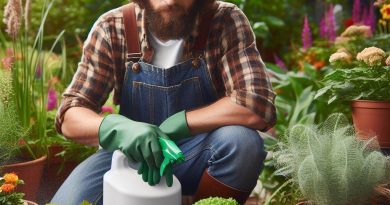Composting Myths Debunked: What Works
Last Updated on March 2, 2024
Introduction
Composting is a natural process that transforms organic waste into nutrient-rich soil.
It is a sustainable way to manage and recycle kitchen scraps, yard waste, and other biodegradable materials.
By composting, we divert waste from landfills, reduce greenhouse gas emissions, and promote healthier soil.
However, there are several misconceptions and myths surrounding composting that need to be debunked.
It’s crucial to dispel these myths to ensure people have accurate information and can successfully compost at home or in their communities.
In this blog post, we will tackle some of the most prevalent composting myths and provide factual information to separate truth from fiction.
We will cover topics such as the time it takes for compost to decompose, the need for a perfect balance of green and brown materials, the inclusion of certain items in compost, and the potential risks of composting.
By addressing these myths, we aim to empower readers to make informed decisions and overcome any barriers they may have encountered in their composting journey.
Join us as we dive into the world of composting and uncover the truth behind common misconceptions.
Whether you’re a seasoned composter or just starting out, this blog post will help you demystify composting and achieve successful results.
Let’s debunk the myths and unlock the full potential of composting for a greener future.
Composting is complicated and time-consuming
A common misconception surrounding composting is that it is a complicated and time-consuming process.
However, this belief is far from the truth. Composting can actually be simple and efficient if done correctly.
Briefly explain the misconception
Many people assume that composting requires extensive knowledge, specialized equipment, and a significant amount of time to be successful.
This misconception often discourages individuals from trying composting altogether.
Evidence/examples of simple and time-efficient composting methods
Contrary to the popular belief, there are several simple and time-efficient methods for composting that anyone can adopt:
- Backyard Composting: This traditional method involves creating a compost pile or using a compost bin in your backyard. Simply layer organic waste, such as kitchen scraps and yard waste, with dry materials like leaves or straw. Turn the pile occasionally to allow for proper aeration.
- Trench Composting: Ideal for small spaces, trench composting involves digging a trench in your garden, filling it with organic waste, and covering it with soil. Over time, the waste decomposes and enriches the soil.
- Vermicomposting: Using worms to break down organic waste is an efficient method that considerably speeds up the composting process. Simply create a worm bin, add your kitchen scraps, and let the worms do their magic.
- Bokashi Composting: This method employs a specialized bin and a mixture of beneficial microorganisms to ferment organic waste. It is a quick and odorless process that produces high-quality compost.
- Composting with Tumblers: Tumblers are enclosed bins that allow for easy turning of the compost. This method accelerates the decomposition process by providing constant aeration and moisture control.
These examples demonstrate that composting can be achieved using a variety of techniques, catering to different lifestyles and available space.
Potential challenges and how to overcome them
While composting may seem daunting at first, addressing potential challenges can help individuals overcome their hesitations.
Here are some common challenges and ways to overcome them:
- Odor and pests: Properly balance the compost by adding a mix of wet and dry ingredients. Avoid adding meat, dairy, and oily foods that attract pests.
- Lack of space: If you have limited outdoor space, opt for alternative methods such as vermicomposting or bokashi composting, which can be done indoors or in compact settings.
- Time constraints: Choose a composting method that fits your schedule, such as using a tumbler that requires minimal maintenance or incorporating composting into your gardening routine.
- Lack of knowledge: Educate yourself about composting through online resources, books, or local workshops. Start with simple methods and expand your knowledge as you gain experience.
By addressing these potential challenges, individuals can overcome the perceived complexities of composting and confidently engage in the practice.
Basically, composting is not as complicated or time-consuming as commonly believed.
With a variety of simple and efficient techniques available, anyone can adopt composting as a sustainable way to manage organic waste and enrich their gardens.
By dispelling the myth and addressing potential challenges, more people can enjoy the benefits of composting while contributing to the environment.
Read: Urban Farming: Getting Started in Cities
Composting creates bad odors and attracts pests
A common misconception about composting is that it leads to unpleasant smells and attracts pests.
However, with proper management, these issues can be easily prevented.
The misconception and common reasons behind it
Many people believe that composting inevitably results in foul odors and invites pests into their yards.
This misconception often stems from improper composting practices, such as:
- Adding meat, dairy, or oily food scraps, which can rot and produce unpleasant smells.
- Using an inadequate carbon-to-nitrogen ratio, leading to anaerobic decomposition and the release of noxious gases.
- Not properly covering the compost pile, allowing pests easy access to the decomposing organic matter.
These misconceptions and practices can discourage individuals from composting, but it is important to understand that bad odors and pests are not inevitable outcomes.
Ways to prevent bad odors and pests in compost
By following a few simple guidelines, it is possible to keep your compost pile smelling fresh and free from unwanted pests:
- Avoid adding meat, dairy, or oily food scraps. Stick to vegetable scraps, fruit peels, coffee grounds, and yard waste.
- Maintain a proper carbon-to-nitrogen ratio. Balance “green” nitrogen-rich materials like vegetable scraps with “brown” carbon-rich materials like dry leaves or shredded newspaper.
- Regularly turn the compost pile to aerate it and promote aerobic decomposition, which reduces the likelihood of odors.
- Ensure the compost pile is moist but not waterlogged. A damp environment is ideal for decomposition, while excessive moisture can lead to rotting and odor problems.
- Cover the compost pile with a breathable material such as a tarp or straw to prevent pests from accessing the organic matter.
Tips for maintaining a balanced and well-managed compost pile
Aside from preventing bad odors and pests, there are additional tips to help maintain a healthy and productive compost pile:
- Chop or shred larger materials into smaller pieces to accelerate the decomposition process.
- Add a handful of garden soil or finished compost to introduce beneficial microorganisms that aid in decomposition.
- Monitor the moisture level regularly and adjust as needed. It is better to keep the pile slightly moist rather than too dry.
- Turn the compost pile regularly, ideally once every one to two weeks, to mix the contents and promote even decomposition.
- Avoid adding weeds or plants that have gone to seed, as the composting process may not eliminate their viability.
- Consider using a compost thermometer to monitor the internal temperature, which should ideally be between 110°F and 160°F (43°C and 71°C) for effective decomposition.
By following these tips and maintaining a well-managed compost pile, you can enjoy the benefits of composting without any unpleasant odors or pest issues.
Read: Winter Prep for Your Garden & Farm
Composting requires a large outdoor space
The false assumption that composting can only be done in a backyard
Composting is often misunderstood as a practice exclusive to those with spacious backyards or gardens.
However, this perception is far from the truth.
Composting can be done in various settings, including small spaces like balconies, patios, or even indoors.
Contrary to popular belief, composting in a small space can be just as effective as backyard composting.
By utilizing different composting techniques and methods, even apartment dwellers can have thriving compost piles.
Alternative composting methods suitable for small spaces (e.g., apartment composting)
One alternative method suitable for small spaces is vermicomposting, which involves using worms to break down organic waste.
This method can be easily done indoors, making it perfect for apartment composting.
Worm bins can be kept in a closet or under a kitchen sink, taking up minimal space.
Another option for small-scale composting is bokashi composting.
This Japanese method relies on a fermentation process to compost organic waste, including meat and dairy products.
Bokashi bins are airtight and odorless, allowing them to be stored indoors without any unpleasant smells.
Composting enthusiasts living in small spaces can also consider using compost tumblers or compact compost bins.
These containers are designed to fit in limited spaces and can be easily rotated or turned to speed up the composting process.
Benefits of small-scale composting and community composting initiatives
Engaging in small-scale composting or participating in community composting initiatives can have numerous benefits.
Firstly, it reduces the amount of organic waste that goes to landfills, thus reducing greenhouse gas emissions and environmental pollution.
Small-scale composting also allows individuals to create nutrient-rich soil amendments for their indoor plants, balcony gardens, or even small vegetable patches. This homemade compost can replace the need for store-bought fertilizers, saving money and promoting sustainable gardening practices.
Community composting initiatives, on the other hand, provide a platform for individuals without access to outdoor spaces to compost their organic waste.
These initiatives often involve shared compost bins or drop-off locations where community members can contribute their food scraps and garden waste.
Furthermore, community composting fosters a sense of connection and collaboration among neighbors, creating a tangible impact on local sustainability efforts.
It encourages education and awareness about the benefits of composting, inspiring others to adopt eco-friendly practices.
In fact, composting is not limited to those with large outdoor spaces, debunking the myth that it requires expansive gardens or backyards.
Alternative methods such as vermicomposting, bokashi composting, and using compact compost bins make composting feasible for individuals living in small spaces.
Additionally, community composting initiatives provide opportunities for communal composting and promote sustainability on a larger scale.
By embracing these alternatives, everyone can contribute to reducing waste and nurturing a healthier planet, regardless of the size of their living space.
Read: Small Garden? Big Savings: Water Efficiency Tips

Composting is only for yard waste
A common misconception surrounding composting is the belief that it is limited to grass clippings and garden waste.
However, this myth can be easily debunked.
Composting is a versatile process that can accommodate a wide range of organic materials, offering numerous benefits.
Dispel the notion that only grass clippings and garden waste can be composted
Contrary to popular belief, composting is not restricted to yard waste.
While grass clippings and garden waste are indeed compostable, they are just a fraction of the potential organic materials that can be effectively composted.
It is important to note that various organic materials can be composted, including but not limited to:
- Kitchen scraps such as fruit and vegetable peels, coffee grounds, tea bags, and eggshells.
- Leaves, twigs, and branches from pruning or tree maintenance.
- Household paper waste like shredded newspaper, cardboard, and paper towels.
- Straw and hay.
- Wood chips and sawdust from untreated wood.
- Animal manure, as long as it is from herbivores and not carnivorous animals.
- Non-greasy food leftovers and plate scrapings.
By dispelling the notion that composting is limited to yard waste, individuals can embrace a wider range of organic materials in their composting efforts, minimizing waste and maximizing the benefits of compost.
Comprehensive list of what can and cannot be composted
To further clarify the composting process, it is beneficial to provide a comprehensive list of what can and cannot be composted.
Materials that can be composted
- Grass clippings
- Garden waste
- Fruit and vegetable scraps
- Coffee grounds
- Tea bags
- Eggshells
- Leaves, twigs, and branches
- Shredded newspaper
- Cardboard
- Paper towels
- Straw and hay
- Wood chips and sawdust (untreated wood)
- Herbivore animal manure
- Non-greasy food leftovers and plate scrapings
Materials that cannot be composted
- Meat, fish, and dairy products
- Glossy or coated paper
- Greasy food waste
- Animal feces (from carnivorous animals)
- Coal or charcoal ash
- Diseased or insect-infested plants
By following these guidelines, individuals can ensure the success of their composting efforts while avoiding potential issues.
Benefits of composting various organic materials, including kitchen scraps, coffee grounds, etc.
Composting various organic materials, including kitchen scraps and coffee grounds, offers numerous benefits:
- Reduces waste: Composting diverts organic waste from landfills, reducing overall waste and its associated environmental impact.
- Enriches soil: The resulting compost is nutrient-rich, improving soil structure, fertility, and overall plant health.
- Retains moisture: Compost helps soil retain moisture, reducing the need for frequent watering.
- Suppresses diseases: Certain compost blends can help suppress plant diseases, reducing the need for chemical interventions.
- Encourages beneficial organisms: Compost supports the growth of beneficial microorganisms and earthworms, enhancing soil health.
By composting a variety of organic materials, individuals can harness these benefits and contribute to a more sustainable and eco-friendly lifestyle.
In short, composting is not limited to yard waste.
It can encompass an extensive range of organic materials such as kitchen scraps, coffee grounds, leaves, and branches, offering numerous advantages.
By dispelling the myth that composting is solely for grass clippings and garden waste, individuals can embrace a wider range of materials, effectively reduce waste, and create nutrient-rich compost for healthier soil and plants.
Read: Fall Harvest Guide: Best Practices
Compost needs to be turned regularly to decompose
The myth and its origin
One common misconception about composting is the belief that regular turning is necessary for decomposition.
This myth likely originated from the idea that turning the compost speeds up the process and prevents odors.
However, this is not entirely true.
Introduce the concept of passive composting and the role of microorganisms:
Passive composting, also known as cold composting, is a method that involves allowing organic materials to break down naturally without frequent turning.
This process relies on the activity of microorganisms, such as bacteria and fungi, to decompose the organic matter.
Tips for successful composting without frequent turning:
- Create a proper compost pile: Start by layering organic materials such as kitchen scraps, yard waste, and shredded leaves. This will provide a good balance of carbon and nitrogen, essential for decomposition.
- Ensure proper moisture: Aim for a moisture level similar to a wrung-out sponge. Too much moisture can lead to a smelly, anaerobic pile, while too little can slow down decomposition.
- Add a compost activator: If you want to speed up the process, you can add some compost activators, such as well-aged manure or finished compost, to introduce beneficial microorganisms.
- Use larger organic materials: Instead of finely chopping or shredding materials, leave them in larger pieces. This helps create air pockets within the pile, allowing oxygen to reach the microorganisms and promote decomposition.
- Optimize aeration: To ensure sufficient oxygen, you can occasionally insert a few PVC pipes or wooden dowels into the pile. These will create channels for air circulation without the need for turning.
- Monitor temperature and adjust: Regularly check the internal temperature of the compost pile using a compost thermometer. If the temperature remains in the optimal range of 130-150°F (55-65°C), it indicates active decomposition.
- Be patient: Passive composting may take longer compared to active methods, but with time, organic materials will break down, resulting in nutrient-rich compost.
- Harvest your compost: Once the materials in your compost pile have fully decomposed, you can harvest the compost by sifting it through a mesh screen. The finished product can then be used to enrich your garden soil.
Following these tips enables successful composting without regular turning, disproving the notion of its necessity for decomposition.
Passive composting, leveraging microorganisms, yields nutrient-rich compost when managed properly.
Understanding basics, adding materials, and monitoring lead to successful composting.
Find Out More: Permaculture in Small Urban Gardens
Conclusion
In this blog post, we have successfully debunked several common myths surrounding composting.
We have clarified that composting does not attract rodents or pests, debunking the misconception that it creates an unsanitary environment.
Additionally, we have explained that composting can be done in small spaces or urban areas, dispelling the belief that it requires a large backyard or rural setting.
By debunking these myths, we hope to highlight the importance of composting for waste reduction and environmental sustainability.
Composting is a natural process that converts organic matter into nutrient-rich soil, reducing the amount of waste sent to landfills and helping to mitigate greenhouse gas emissions.
It also improves soil quality, promotes plant growth, and conserves water.
We strongly encourage readers to give composting a try.
Even if you live in a small apartment or lack outdoor space, there are various composting methods, such as vermicomposting or using a countertop composter, that can accommodate different living situations.
Composting can be simple and rewarding, allowing you to contribute to a more sustainable future.
In review, composting is a valuable practice for waste reduction and environmental preservation.
Don’t let these debunked myths hold you back from trying composting yourself.
Start small, do your research, and you’ll soon discover the benefits of composting firsthand.
Together, we can make a positive impact on our planet.


